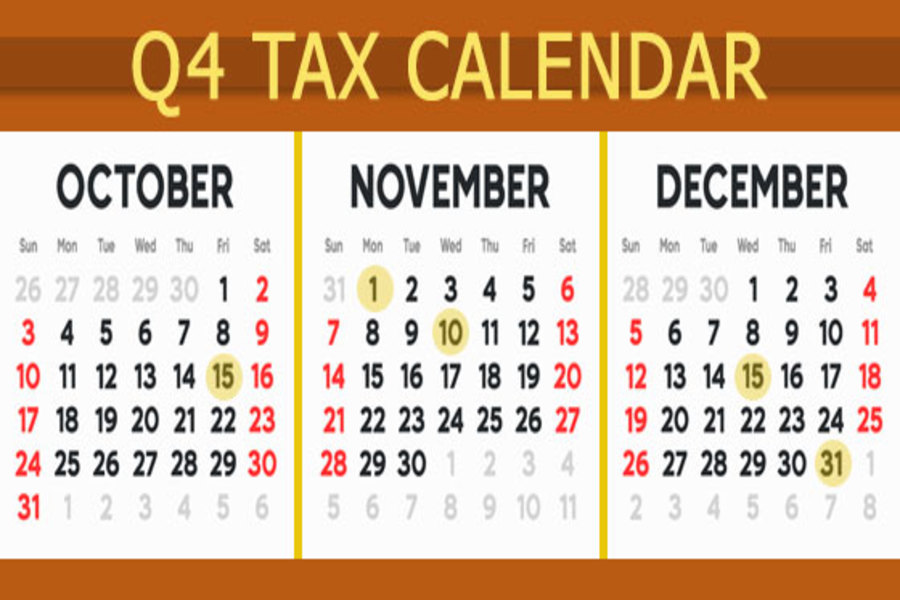Here are some of the key tax-related deadlines affecting businesses and other employers during the fourth quarter of 2021. Keep in mind that this list isn’t all-inclusive, so there may be additional deadlines that apply to you. Contact us to ensure you’re meeting all applicable deadlines and to learn more about the filing requirements. Note: Certain tax-filing and tax-payment deadlines may be postponed for taxpayers who reside in or have a business in federally declared disaster areas. Friday, October 15 If a calendar-year C corporation that filed an automatic six-month extension: File a 2020 income tax return (Form 1120) and pay any tax, interest and penalties due. Make contributions for 2020 to certain employer-sponsored retirement plans. Monday, November 1 Report income tax withholding and FICA taxes for third...

Studies have found that more people are engaging in online gambling and sports betting since the pandemic began. And there are still more traditional ways to gamble and play the lottery. If you’re lucky enough to win, be aware that tax consequences go along with your good fortune. Review the tax rules Whether you win online, at a casino, a bingo hall, a fantasy sports event or elsewhere, you must report 100% of your winnings as taxable income. They’re reported on the “Other income” line of your 1040 tax return. To measure your winnings on a particular wager, use the net gain. For example, if a $30 bet at the racetrack turns into a $110 win, you’ve won $80, not $110. You must separately keep track of losses....
(This is Blog Post #1104)...
At first glance, calculating restitution for fraud damages may seem relatively simple. If someone steals $10,000 from a company, that person should repay that amount, perhaps with interest, right? Not quite. Financial experts also consider the profits the business lost because of the fraud — and weigh different methods of computing damages. The appropriate approach Experts typically use either the benefit-of-the-bargain or out-of-pocket approach to calculate damages. The appropriate method depends to some degree on the location and nature of the fraud. But in most cases, the benefit-of-the-bargain method results in greater restitution for victims. Take, for example, a property developer who buys a parcel of land that the seller says is worth $1 million but is offering at $900,000. In truth, the seller is lying about the...
Low interest rates and other factors have caused global merger and acquisition (M&A) activity to reach new highs in 2021, according to Refinitiv, a provider of financial data. It reports that 2021 is set to be the biggest in M&A history, with the United States accounting for $2.14 trillion worth of transactions already this year. If you’re considering buying or selling a business — or you’re in the process of an M&A transaction — it’s important that both parties report it to the IRS and state agencies in the same way. Otherwise, you may increase your chances of being audited. If a sale involves business assets (as opposed to stock or ownership interests), the buyer and the seller must generally report to the IRS the purchase...
Given the escalating cost of health care, there may be a more cost-effective way to pay for it. For eligible individuals, a Health Savings Account (HSA) offers a tax-favorable way to set aside funds (or have an employer do so) to meet future medical needs. Here are the main tax benefits: Contributions made to an HSA are deductible, within limits, Earnings on the funds in the HSA aren’t taxed, Contributions your employer makes aren’t taxed to you, and Distributions from the HSA to cover qualified medical expenses aren’t taxed. Who’s eligible? To be eligible for an HSA, you must be covered by a “high deductible health plan.” For 2021, a high deductible health plan is one with an annual deductible of at least $1,400 for self-only coverage,...
Vendor fraud can be costly — particularly when several perpetrators are involved. The median loss of a fraud scheme conducted by two individuals is $200,000, according to the Association of Certified Fraud Examiners. Losses rise precipitously to more than $500,000 when four or more people commit the fraud. These schemes typically involve the collusion of employees with outside parties or a conspiracy between suppliers. But you can help prevent vendor fraud in your business by familiarizing yourself with the schemes. Types of schemes Vendor fraud can take one of several forms. Price fixing is an agreement among competitors to set the same price for goods or services. It also refers to competitors jointly establishing a price range or minimum price. Such agreements violate the Sherman Antitrust Act,...
If you use an automobile in your trade or business, you may wonder how depreciation tax deductions are determined. The rules are complicated, and special limitations that apply to vehicles classified as passenger autos (which include many pickups and SUVs) can result in it taking longer than expected to fully depreciate a vehicle. Cents-per-mile vs. actual expenses First, note that separate depreciation calculations for a passenger auto only come into play if you choose to use the actual expense method to calculate deductions. If, instead, you use the standard mileage rate (56 cents per business mile driven for 2021), a depreciation allowance is built into the rate. If you use the actual expense method to determine your allowable deductions for a passenger auto, you must make a separate depreciation...
Many homeowners across the country have seen their home values increase recently. According to the National Association of Realtors, the median price of homes sold in July of 2021 rose 17.8% over July of 2020. The median home price was: $411,200 in the Northeast, $275,300 in the Midwest, $305,200 in the South, and $508,300 in the West. Be aware of the tax implications if you’re selling your home or you sold one in 2021. You may owe capital gains tax and net investment income tax (NIIT). Gain exclusion If you’re selling your principal residence, and meet certain requirements, you can exclude from tax up to $250,000 ($500,000 for joint filers) of gain. To qualify for the exclusion, you must meet these tests: You must have owned the property for...
What do COVID-19, major hurricanes and West Coast wildfires have in common? All three have attracted scam artists, who have bilked disaster victims, charitable donors, insurance companies and government agencies out of billions of dollars. Also, all of these disasters — and the criminals who take advantage of them — are the focus of The National Center for Disaster Fraud (NCDF). Let’s take a look at what this partnership between the U.S. Justice Department and various law enforcement and regulatory agencies does to investigate and prevent fraud. Investigate and prevent The NCDF was established in 2005 after Hurricane Katrina to combat the massive fraud schemes that emerged as financial aid poured into the Gulf region. The agency now coordinates investigations into all kinds of natural and manmade...
- 1
- 2
- 3
- 4
- 5
- 6
- 7
- 8
- 9
- 10
- 11
- 12
- 13
- 14
- 15
- 16
- 17
- 18
- 19
- 20
- 21
- 22
- 23
- 24
- 25
- 26
- 27
- 28
- 29
- 30
- 31
- 32
- 33
- 34
- 35
- 36
- 37
- 38
- 39
- 40
- 41
- 42
- 43
- 44
- 45
- 46
- 47
- 48
- 49
- 50
- 51
- 52
- 53
- 54
- 55
- 56
- 57
- 58
- 59
- 60
- 61
- 62
- 63
- 64
- 65
- 66
- 67
- 68
- 69
- 70
- 71
- 72
- 73
- 74
- 75
- 76
- 77
- 78
- 79
- 80
- 81
- 82
- 83
- 84
- 85
- 86
- 87
- 88
- 89
- 90
- 91
- 92
- 93
- 94
- 95
- 96
- 97
- 98
- 99
- 100
- 101
- 102
- 103
- 104
- 105
- 106
- 107
- 108
- 109
- 110
- 111
- 112
- 113
- 114
- 115
- 116
- 117
- 118
- 119
- 120
- 121
- 122
- 123
- 124
- 125
- 126
- 127
- 128
- 129
- 130
- 131
- 132
- 133
- 134
- 135
- 136
- 137
- 138
- 139
- 140
- 141
- 142
- 143
- 144
- 145
- 146
- 147
- 148
- 149
- 150
- 151











